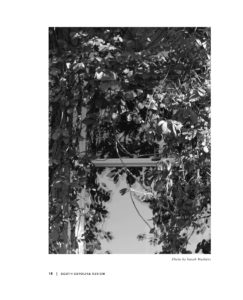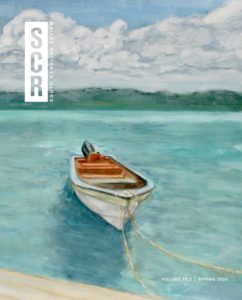 SCR Assistant Editor Wesley Kapp interviews Sadie Hoagland on her story collection entitled American Grief in Four Stages. Hoagland’s story, “Extra Patriotic,” is featured in SCR Volume 51.2.
SCR Assistant Editor Wesley Kapp interviews Sadie Hoagland on her story collection entitled American Grief in Four Stages. Hoagland’s story, “Extra Patriotic,” is featured in SCR Volume 51.2.
Interview with Author Sadie Hoagland
WK: American Grief in Four Stages is described as a short story collection that explores the inability of language to capture traumatic experiences. I find this idea compelling, and I thought that each story in this collection revealed this truth in different ways. Can you tell us more about this concept and what inspired you to create this specific body of work?
SH: Our tendency as humans is to try to find a narrative that explains our lives, and yet some events defy the logic of a narrative. There is no story that can explain suicide, for example, and the language we use to comfort the bereaved is itself clichéd (e.g. “Sorry for your loss”). I was interested, and even frustrated by this failure in my own life, and so some of the stories in the collection engage this failure of language directly, such as the title story and “Warning Signs.” Both of the narrators of these stories are using extreme language posturing to try to bring the reader into their own state of shock: “If I knew why my little brother shot himself through the head then, man, I’d be rich.” They are also using language as armor; knowing that words can’t express their loss, perhaps they can at least use language to hide their pain. In other stories, the ineptitude of language is explored much more subtly. For example, in “The Crossword,” an old woman is using crossword clues as memory cues, and each word reveals a complex root system into her past, proliferations of meanings of the word known only to her. Pie is a three-letter crossword answer, but also a memory of the woman as a young girl, with her cousin, a tension in the air. Language, then, always conceals more than it reveals in this way; it connects us by what we say, while always reminding us of that which remains hidden within us, what we don’t say. I’m intrigued by this idea (which is probably why I am a writer).
WK: I love the title “Cavalier Presentations of Heartbreaking News”, and I thought it described that story so well. It seems that everyone has their own way of giving and receiving bad news, and I found it interesting to see that play out in this particular story. Can you tell us a little bit about why you wrote this story? I’m also really interested in the concept of electric birds.
SH: Ha! I feel like you read right through this story straight to me. I do think people present bad news often very casually, and I never not feel it. Perhaps this a great weakness, or a strength that led me to fiction writing, but I do feel the empathy center in my brain is a tad large, and impractically so. I am often in the position of the narrator to a lesser degree, where someone tells me something that I process viscerally. Interestingly enough, when I was in my twenties, older women, strangers, would often tell me stories of almost brutal sadness and even more interestingly, several of these stories involved birds. This perhaps, on an unconscious level, is why I wrote this story. The electric birds were a starting point, that first line, “It was my birthday when I found out all the birds were electric…” came into my head and was too compelling a thread not to follow. But having the birds in the story also created a sense of tension between the possible and impossible that led me further into the plot. If it was possible that birds were electric, then maybe our narrator can find her way through the impossibility of a cancer diagnosis.
WK: “Extra Patriotic” was published recently in South Carolina Review, and it has found a home in this collection. The story follows two characters dealing with PTSD. Similar to other stories in the collection, “Extra Patriotic” leaves the reader with an idea of what happens next but no sure answer. The characters press on, but we aren’t sure that happiness is in store for them. Each character responds to their situation differently. Why did you feel it was important to show these two different responses? Why can’t they make it work, in your mind?
SH: Our culture encourages people to be resilient, to “get over” whatever happens to them, and this is almost the only option. We don’t like to think about the people that can’t rise up out of their struggles, that’s not part of the American story. Yet we’ve learned through vets with PTSD, sometimes we’ve painfully and tragically learned, that this is not the case, we can’t always “get over it.” And while some kinds of trauma are legible, or even have cultural currency, others seem to make people untouchable. Truly isolated. I wanted to think about two characters with two different kinds of trauma from life events that read very differently: one is a “hero,” a war vet, and one a “survivor” of her parents tragic and violent death. Both have different kinds of support systems. One is ready to move forward before the other can move forward, and this creates a distance between them. Perhaps it is surmountable, but not in the moment the story ends. I wanted the reader to remember, to feel, both the possibility of recovery through one character, but also the immensity of the task of recovering from trauma through the other character.
WK: Your career has taken you from California to Utah to your current home in Louisiana. [Hoagland teaches in the PhD writing program at the University of Louisiana-Lafayette.] How have you seen your writing develop differently in each of these places?
SH: It takes me a long time to process space and place, and for a place that has affected me to make it into my writing. My novel, Strange Children, which comes out in Spring 2021 is about a polygamist community in Utah, where I grew up but didn’t write about until I had moved away. I haven’t lived in California for ten years, but I just finished a second novel that takes place in central California. So it seems that for me it’s almost easier to write about a place after I’ve left it. Perhaps there’s a certain clarity I get when I am no longer going about day-to-day life in a place, a distance that allows me to see the nuances of a “where.” Though I will say that even as I live here, Louisiana is starting to seep into my writing, mostly in the form of nonfiction as this place has a wild and strange heart that is almost too uncanny for fiction.
WK: What are you working on now?
SH: I am currently revising my second novel, with a working title of Upside Down in the Sky, about a woman grappling with a sexual assault in her workplace and the disappearance of her troubled mother the same week in California. As she searches and uncovers her mother’s story, she meets her estranged grandmother, starts tracking down a father she never knew, and also discovers that her mother has suffered things she could never have imagined. I am also working on a collection of nonfiction mini-essays about the female body as both a question and answer in various rhetorical spaces, like the medical community, and academia. Stay tuned!


 SCR Assistant Editor Wesley Kapp interviews Sadie Hoagland on her story collection entitled American Grief in Four Stages. Hoagland’s story, “Extra Patriotic,” is featured in SCR Volume 51.2.
SCR Assistant Editor Wesley Kapp interviews Sadie Hoagland on her story collection entitled American Grief in Four Stages. Hoagland’s story, “Extra Patriotic,” is featured in SCR Volume 51.2.